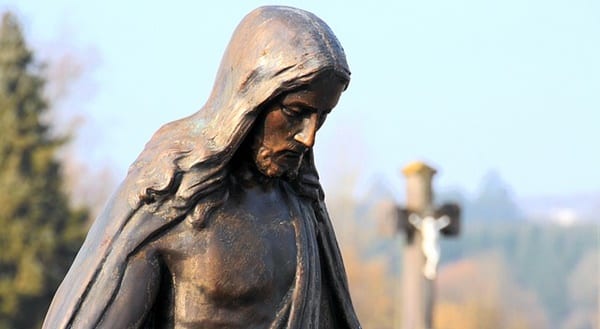
This post is in response to Michael Hardin’s 5-part series Thoughts on the Eucharist. Michael’s series is worth reading and rereading. In light of Maundy Thursday, Michael invited me to reflect on his thoughts. In addition, Rob Grayson wrote a beautiful response to Michael’s series, titled A Revolutionary Meal.
I did it again. We were at the copy machine printing documents for an upcoming meeting. After our usual greetings, we got sucked into a conversation about a co-worker.
“Can you believe what so-and-so said!” my co-worker exclaimed.
“Oh man,” I said as I peeked down the hall to make sure said co-worker wasn’t about to walk by. “That’s not the half of it! So-and-so went on to say this-and-this!”
As you can tell, I’m getting quite skilled at gossiping. That’s because I’ve been burned before. My victims generally have good timing – they frequently walk in on me gossiping about them. I’m much “better” now. I know to look hall.
I feel guilty and a little creepy after every gossip fest. Those feelings are inevitable and I know they are coming. So, why do I gossip?
The ugly, honest truth is that it feels good in the moment. Gossiping is like a drug – it gives me an addictive rush. I find a sense of unity and comradery as I bond with another person over and against our scapegoat.
Why Christianity is Anti-Cultural
What does mundane office gossip have to do with Christianity being anti-culture? Everything.
Today is Maundy Thursday. Christians throughout the world will participate in two events that Jesus experienced on the day before his crucifixion: Jesus washed his disciples’ feet and led the Eucharist.
Maundy comes from the Latin word Mandatum, which means “mandate” or commandment. It is derived from the Gospel of John 13:34. As Jesus washed his disciples’ feet, he said, “A new commandment I give unto you, that you love one another, as I have loved you.”
As Michael explains, Jesus’ loving act of washing feet and the leading the Eucharist are “the most anti-cultural institutions in the world”.
That’s a radical statement! But what makes them anti-cultural? The anthropologist René Girard claims that there is more to my office gossip-fest than what appears to be a little office fun. It’s rooted deep in the ancient practice of scapegoating. Human culture, according to Girard, was founded on the scapegoat mechanism. Whenever hostility arises within a group, that hostility needs an outlet or the group will self-destruct under its own violence. That violent outlet came in the form of a scapegoat who became the group’s sacrificial victim. As Michael puts it, sacrifice is “the mechanism by which culture is formed and religion experienced.” As it turns out, scapegoating through gossip and other forms of violence are deeply rooted in our “cultural and religious DNA.”
That’s why the practices of foot washing and the Eucharist are “the most anti-cultural institutions in the world.” They go against the violent foundations of culture. In foot washing, the One whom Christians call the Lord of our lives doesn’t violently lord his power over anyone. By washing his disciples’ feet, Jesus was enacting his statement that, “The kings of the Gentiles lord it over them…but not so with you; rather, the greatest among you must become like the youngest, and the leader like the one who serves…I am among you as one who serves.”
Notice that Jesus’ message wasn’t just anti-cultural. It also offers an alternative to the violence within human culture. Humble service and nonviolent love that embraces even our enemies are the hallmarks of following Jesus.
Here’s the thing, I know that Jesus calls me to a life of humble service and love, and yet I participate in a culture of scapegoating. It’s like the Apostle Paul wrote, “For I do not do the good I want, but the evil I do not want is what I do.”
Forgiveness: Christianity’s Alternative to Cultural Violence
Which is why the Eucharist is so important. The scapegoating mechanism that I used to unite with my co-worker is the same mechanism that betrayed and killed Jesus. Jesus didn’t offer himself up to an angry god; he offered himself up to an angry, gossiping, and violent humanity. Because I continue to gossip, lie, and cheat, I know the Eucharist is personal. Just like I know that I continue to scapegoat people, I know that I would have betrayed Jesus just like his disciples did.
It’s hard to say this because it’s so personal, but Jesus is my victim. Fortunately, my gossip and violence don’t have the last word. Jesus has the last word. The good news is that Jesus doesn’t respond to violence against him with more words of violence and revenge. That would be the old cultural way of responding to violence. Jesus is making a new humanity, new Adam – a new me!, by responding to violence with forgiveness. The Eucharist is about the “forgiveness of sins.” As Michael states, “when we take the cup to drink the blood of our Victim, Jesus, Son of God, True Human, Lord of the Universe, is it revenge we hear? No, it is the cup of forgiveness. In his blood we find only forgiveness.”
That radical forgiveness is anti-cultural because it moves beyond violence and revenge. It moves us into a new pattern of life where we no longer scapegoat; rather, we wash one another’s feet and move towards forgiveness.
For more, read Michael’s series, “Thoughts on the Eucharist” and Rob Grayson’s response, “A Revolutionary Meal.”











